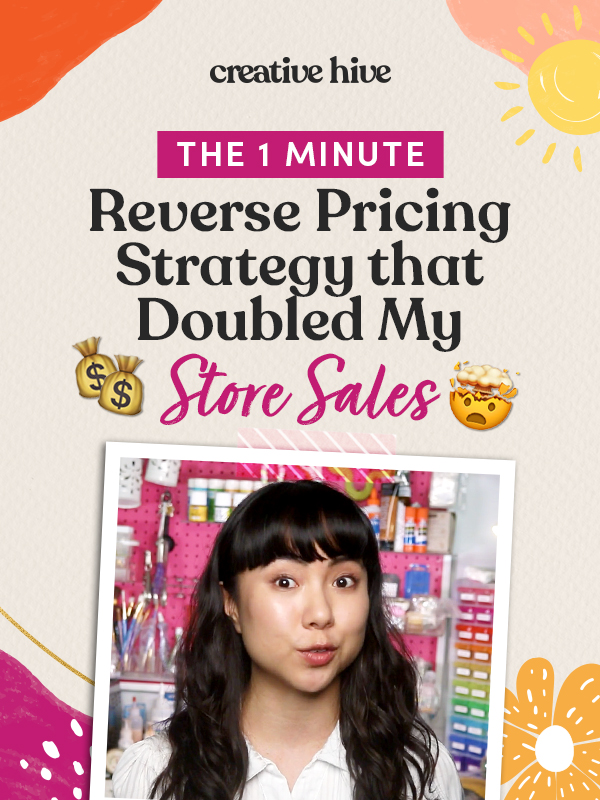I want to help you build a sustainable, profitable handmade business that makes you consistent income and sales. I only ever teach or recommend marketing, social media, pricing, production and branding tips that I’ve personally used successfully in my own 7-figure handmade businesses.
I'm Mei, from Los Angeles!
Read More
Popular Posts You'll Love
Looking for something?
Categories
starting a business
get more traffic
running a business
make more sales
branding
growing a business
mindset & productivity
podcasts
pricing & money
product photography
reviews
selling on etsy
selling on amazon
social media
selling wholesale
- Facebook0
- Twitter0
- Pinterest0
- 0share
Is Etsy still worth it in 2023?
If you’re a handmade business owner, you may have wondered at some point if selling your products on Etsy is still worth it.
I’m sure you’ve already searched the internet for answers – and that’s probably how you found me right here.
Well, I’m happy to share with you my personal experience selling handmade jewelry on Etsy and give you an honest answer about whether it’s still worth it in 2023.
Etsy is known as the online marketplace for all sorts of handmade items.
It is the go-to destination for shoppers who are looking for unique and customized products, ranging from jewelry to home decor.
By the end of 2022, there are already 7.3 million active sellers on Etsy.
Now, that’s a lot of competition right there, isn’t it?
So, is it still worth it to compete on Etsy or should you start considering other eCommerce platforms instead?
Keep reading as I uncover the pros and the cons of Etsy in 2023.
Pros of Selling on Etsy
Etsy is so easy to use and maintain.
One of Etsy’s main selling points is its user-friendliness.
It’s easy to use, whether you’re already a seasoned seller or a complete beginner.
In fact, you don’t need to be an expert to know how to code to create a store and sell your products professionally online.
Etsy is also relatively easy to maintain since they will take care of everything for you, from payment processing to shipping.
This saves sellers time and effort, making it easier for sellers to focus on creating products and providing great customer service instead.
Etsy also offers free resources to help sellers improve their businesses.
For example, they have guides for branding and marketing, which can be helpful for sellers who don’t have any background in those areas.
They also offer webinars on how to increase sales, giving sellers insider tips and tricks on how to succeed on Etsy.
Etsy really gives you everything you need to grow your business and reach your full potential as a seller.
Etsy already has an established audience that is still growing.
Did you know that, by the end of 2022, Etsy had around 93.9 million active shoppers? That’s a huge number!
Well, there’s no denying that people still appreciate and value buying unique and personalized products.
So, when you hop on the Etsy train, it means that you can potentially be discovered by a wide, already-established audience that trusts Etsy.
Plus, Etsy caters to a specific niche, unlike other eCommerce marketplaces like Amazon.
Etsy’s users are fans of the unique, the handmade, and the vintage.
This creates a sense of community among Etsy sellers and buyers, who both share a common interest in these types of products.
This sense of community helps drive sales and create a proven handmade customer base.
It’s a great platform to sell your products and connect with others who love what you do.
Unfortunately, Etsy is not exactly all rainbows and sunshines for handmade sellers.
Etsy has also attracted a lot of resellers whose products aren’t handmade at all and even many counterfeit products, and I’ll talk more about this below.
Etsy is a great place to start a handmade business and test the waters.
Setting up your shop on Etsy is super easy and affordable, which is why so many small business owners and artists are signing up.
The best part is that there’s no cost to sign up or pay a monthly fee for hosting or anything like that.
When you sell on Etsy, you can potentially reach a really wide audience without having to learn how to code or invest in extensive web design or hosting.
Etsy’s storefront is a simple way to showcase your products in a visually appealing and engaging way, so you can easily encourage people to buy your products.
But, while the low cost of entry is definitely a key advantage of selling on Etsy, it’s important to remember that success on the platform requires time, effort, and a well-crafted highly converting shop.
Now that we’ve talked about the advantages of selling on Etsy, let’s talk about the disadvantages.
Cons of Selling on Etsy
Etsy is oversaturated.
Selling on Etsy may seem like an exciting opportunity with its whopping 93 million users, but let’s not forget about the competition – 7.3 million active sellers!
Etsy is a competitive marketplace, and with so many sellers trying to capture the attention of the same audience, it can be tough to stand out.
You may even come across similar products offered by other sellers.
The competition, then, turns into price wars and the so-called discount culture.
Everyone is trying to sell their products, and many sellers think that if they constantly offer discounts or if their prices are lower than their competitors’ then people would buy from them instead.
And this is not sustainable for a business!
And as I mentioned a while ago, a lot of Etsy’s seller population are resellers who don’t sell handmade products at all.
This creates an unfair competition, since their cost to manufacture their products is a fraction of what it takes to create a genuine handmade product, so they can charge much less than us, and as a result, people will buy from them instead.
So, when you sell on Etsy, it’s important to remember that relying solely on its algorithm won’t necessarily drive traffic to your store.
While it’s exciting to be a part of such a large community, it’s also important to figure out how you’re going to differentiate yourself from the competition and stand out, aside from just discounting your prices.
It can be difficult to keep up with Etsy’s constant changes to the platform.
Etsy is always introducing new changes.
The changes are usually good, but they can also be too much for sellers who are trying to keep up with the latest trends and best practices.
It’s hard to keep up with the changes and sellers need to stay informed about the latest features and constantly adjust their strategies.
One of the biggest challenges for Etsy sellers is navigating the platform’s algorithm.
It can be difficult to understand how the algorithm works and what factors determine visibility in search results.
This can lead to a lot of stress and confusion for sellers who are trying to optimize their listings and get more views.
And frankly, it is a pretty technical process optimizing keywords and figuring out how to arrange them in your titles.
That doesn’t sound like fun at all to me and I personally believe you can have a business that you really enjoy running.
If you want to know more about how I do that, I host a free workshop around how you can do that too.
Your customers are loyal to Etsy, not to your brand.
I want to share with you my main problem with Etsy.
Say, for example, a customer buys a necklace from your Etsy shop.
Their friend sees it and says, “Oh, wow! That’s a pretty necklace! Where did you get that from?”
What will your customer say?
Most usually, they’ll say that it’s from Etsy – not your shop.
They might not even remember the name of your shop, because in their head they bought it from Etsy.
See, Etsy’s branding can overshadow yours.
This can make it hard for you to build a loyal customer base or grow your brand outside of Etsy too.
And this will harm your business in the long run.
At the end of the day, you want them to respond, “Oh, this necklace? I got it from Tiny Hands!” and maybe even offer to send the link to your shop.
Etsy can shut down your shop in an instant.
Another hard truth about Etsy is that you don’t really own your shop.
Instead, you’re merely renting a space on Etsy’s platform which means you’ll need to follow all of Etsy’s policies.
These policies can be quite strict, and if you don’t comply with them, Etsy has the right to take action against your shop.
This can range from a warning to shutting down your shop completely without any notice.
As you can imagine, having your shop shut down would be devastating for both your finances and emotions.
That’s why it’s important to read and understand Etsy’s policies in detail before setting up shop.
It’s also important to stay up-to-date with any changes to their policies to ensure that you’re always in compliance.
And at the risk of sounding like I’m fear mongering (which I’m not trying to do), I feel I should mention this because it did happen to us.
You can be in compliance with Etsy terms, but it is so easy for anyone to file a DMCA complaint on your shop.
It’s a process that doesn’t require human review on Etsy, so someone who might be out to get you can easily take your shop listings down, regardless of whether or not they had the right to do so. It sucks.
So is Etsy still worth it in 2023?
Yes, Etsy is still worth it.
In fact, I believe that it can be a great platform for handmade business owners to showcase and market their products.
However, relying solely on the platform to generate income may not be the best strategy.
In my experience, it’s important to diversify your sources of income to minimize risk and maximize potential revenue.
I do recommend handmade business owners to build their own website and focus primarily on that first, in addition to having an Etsy shop.
Having your own website can give you more control over your branding, customer experience, and sales process.
You can also drive traffic to your website through social media, email marketing, and influencer outreach.
I would not recommend doing all of that just to send traffic to Etsy.
Etsy makes it so easy for your customers to click over to your competitors’ shops and buy from them instead.
Of course, having an Etsy shop can still be valuable as a passive source of income.
It can help you reach a wider audience and benefit from Etsy’s search algorithm and marketing efforts.
Plus, you don’t have to worry about website maintenance and hosting fees and security.
I believe that Etsy can complement your handmade business, but it shouldn’t be your only source of income.
Are you still going to try selling your handmade products on Etsy? Let me know in the comments.

Leave a Comment
Liked this article? Share it!
Unlock a Profitable Handmade Business
in Just 12 Weeks Without Using Etsy
or Social Media
FREE WORKSHOP
This workshop is for anyone who makes and sells a handmade or physical product, including jewelry designers, artists, paper designers, bath & body product makers and more!
What You'll Discover
The #1 mistake people make with Etsy & social media that causes shops to FLOP
The secret to making it with your handmade shop so it's no longer just a hobby
How to make sales in your handmade shop with ease so you can finally get to 6-figures
TAKE ME THERE
Your email address will not be published. Required fields are marked *
Leave a Reply Cancel reply
About
Blog
A Sale A Day
Student Login
Free Class
Contact
Terms
Become A Student
Watch On YouTube
Student Reviews
See My Handmade Shop!




Thanks for sharing this, this is amazing. i like it.
I appreciate your posting. I’ve read about a lot of related subjects! Contrary to other articles, yours left me with a really distinct impression. I hope you’ll keep writing insightful posts like this one and others for us to everyone to read!